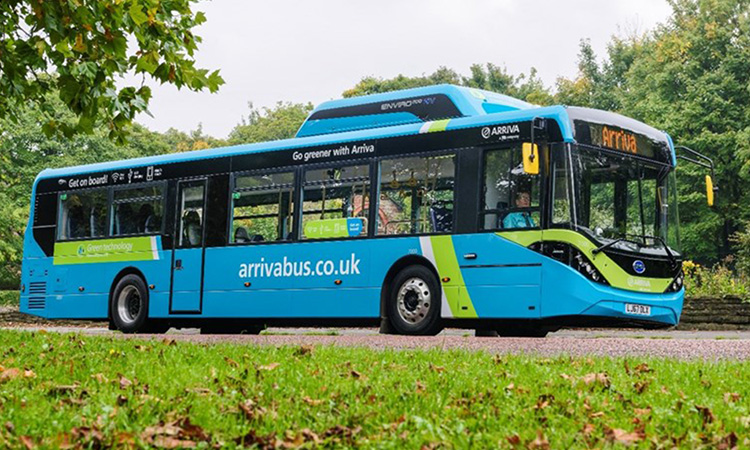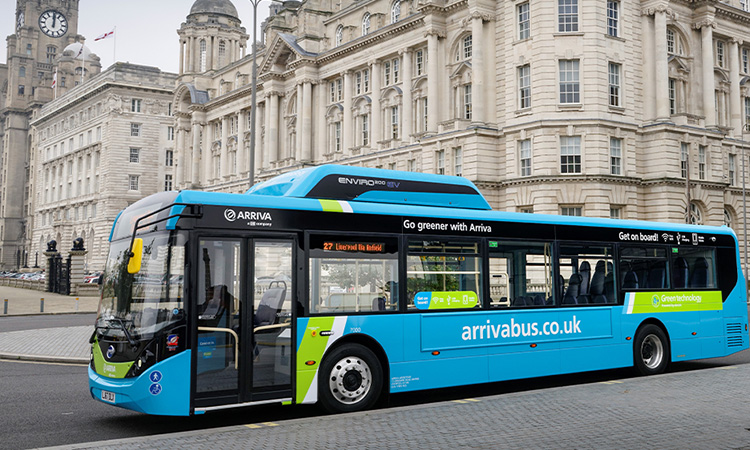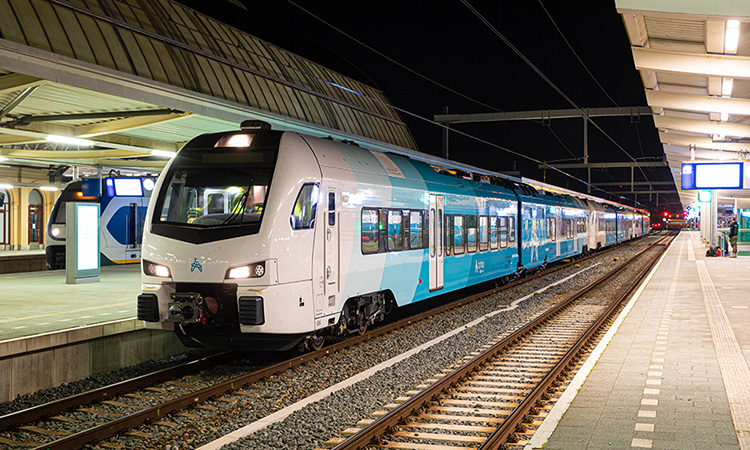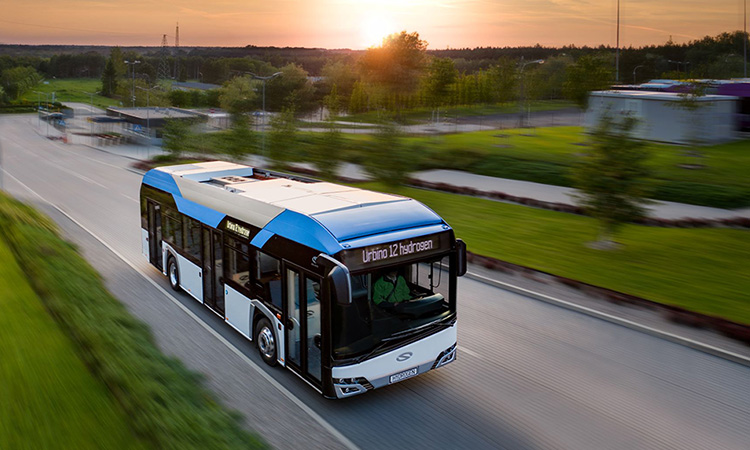Arriva’s Zero Emission Institute: Accelerating the decarbonisation of public transport
- Like
- Digg
- Del
- Tumblr
- VKontakte
- Buffer
- Love This
- Odnoklassniki
- Meneame
- Blogger
- Amazon
- Yahoo Mail
- Gmail
- AOL
- Newsvine
- HackerNews
- Evernote
- MySpace
- Mail.ru
- Viadeo
- Line
- Comments
- Yummly
- SMS
- Viber
- Telegram
- Subscribe
- Skype
- Facebook Messenger
- Kakao
- LiveJournal
- Yammer
- Edgar
- Fintel
- Mix
- Instapaper
- Copy Link
Posted: 3 May 2023 | Matt Greener - Arriva Group | No comments yet
One of Intelligent Transport’s newest Advisory Board Members, Matt Greener, provides insight into the role that Arriva’s Zero Emission Institute will play in accelerating the decarbonisation of public transportation and the significance of using data and technology to create more efficient and sustainable transport systems, as well as why collaboration within the industry is key to achieving climate action targets.


Credit: Arriva Group
Can you tell us about Arriva’s Zero Emission Institute and the role that it plays in driving the company’s net zero strategy?
Arriva launched the Zero Emission Institute to help to accelerate decarbonisation. We wanted to create a central hub of knowledge and expertise to support passenger transport authorities (PTAs) in the development and delivery of fleet decarbonisation strategies. We have a unique footprint across Europe, so we have had the opportunity to work with a number of different fuel and energy types, and in different geographic and climatic locations. This means that we are well-placed to share our expertise and work with PTAs to help them to achieve their long-term goals.
We feel strongly that the transport industry must work together in partnership if we are to ensure successful decarbonisation – no single operator can do this alone”
We feel strongly that the transport industry must work together in partnership if we are to ensure successful decarbonisation – no single operator can do this alone. For this reason, a key role of our institute is to forge relationships and strategic partnerships with external organisations, including suppliers, industry bodies, manufacturers and academic institutions. By working together towards common goals, we can accelerate the process of decarbonisation and adopt the latest innovations and advanced data analytics.
We cannot rely on any single solution for decarbonisation – instead, we will need to establish the right technology for each of the countries and regions that we serve based on our clients’ objectives, operational requirements, energy grid capacity and alternative bio-fuel availability.


Credit: Arriva Group
What contribution do alternative fuels, such as hydrogen and electricity, have in achieving Arriva Group’s climate action targets?
Electricity and hydrogen are currently the only viable options for zero-emission operations and, therefore, they play a major role in any decarbonisation journey. But focusing on these alone will hinder progress. Both electric and hydrogen require significant capital investment, not just for the vehicles, which are much more expensive than diesel – double or triple the cost – but also because of the associated fuelling infrastructure which requires significant long-term planning and the need for a secure and reliable green energy supply.
By focusing on electric and hydrogen alone, there is a risk that we miss an opportunity to decarbonise in the short-term”
Our initial focus for electric and hydrogen is centred around markets where we have city bus operations and where eliminating all emissions, not just CO2, brings the biggest benefit to air quality to improve the lives of the local communities that we serve. In these markets, we want to ensure that our energy can come from renewable sources, and this is a major consideration in planning for the future. We need to work closely with our clients to ensure that we are choosing the right type of fuel technology together, and that this fits with long-term investment plans.
By focusing on electric and hydrogen alone, there is a risk that we miss an opportunity to decarbonise in the short-term. For this reason, we are also looking at hydrotreated vegetable oil (HVO) and bio-gas as useful alternative fuels that give an immediate reduction in CO2 and can be used in our existing fleet with limited capital investment. By turning to these fuels, we can decarbonise faster, while also working on advancing our full zero-emission fleet plans in tandem. This is a strategy that we have used successfully in the Netherlands, where Arriva intends to be carbon neutral by 2025. All diesel trains in Fryslân and Groningen have recently been transitioned to HVO, reducing carbon emissions by 90%.


Credit: Arriva Group
Are public-private partnerships key to decarbonising the transport sector and, if so, why?
We see partnership and close collaboration as one of the most important factors in accelerating the transition to clean energy.
The Zero Emission Institute is also forging relationships and partnerships with green energy companies, academic institutions, technological innovators… with a view to bringing the latest emerging technologies and expertise to our PTA clients”
We are already working alongside our passenger transport authority clients to encourage long-term planning, which will determine our investment decisions. The Zero Emission Institute is also forging relationships and partnerships with green energy companies, academic institutions, technological innovators, engineers, vehicle designers and manufacturers, with a view to bringing the latest emerging technologies and expertise to our PTA clients, helping us to build joint strategies and plans.
By being part of the conversation early, we also have an opportunity to influence and shape future thinking and emerging innovation to ensure commercial viability for operators.
We have always been clear that decarbonisation is not something that one operator can achieve without the whole industry pulling in the same direction. For example, infrastructure and energy providers must plan where and when they need to upgrade the grid or uplift the production of alternative fuels, and they can only do so when they know what the demand is going to look like.
We are seeing a rapid pace of change, with new solutions coming into the market, so for our clients to get the best value out of whatever solution they go with, we need to ensure that we really understand their objectives and can help them achieve those for the long-term.


Credit: Arriva Group
What projects that are currently in development at the Zero Emission Institute are most excited about?
In 2023, we are introducing a fleet of hydrogen buses in the UK and Netherlands, and this will help us to gather valuable data and real-world experience from the process of implementation, as well as the operational performance of the vehicles. We expect to be able to gather insights which we can share amongst our teams across Europe and also with our clients, who might also be considering hydrogen as a zero-emission fuel.
We are also seeing the investment that we’ve made in building a completely new combined depot and head office in Madrid being utilised, with a new fleet of electric buses entering service. We took delivery of nine electric buses in early March 2023, and we will welcome another six in June 2023.
Batteries play a critical role in decarbonisation, but this type of technology is relatively immature, and there are still many unknowns”
Another area of focus is how we manage our batteries. Batteries play a critical role in decarbonisation, but this type of technology is relatively immature, and there are still many unknowns. We are examining lifecycles and starting to think about how to extend the life of batteries and how we could potentially re-purpose them for alternative uses once they have reached an age whereby they are no longer able to store enough energy for us to complete our daily operations. Once at this stage, they could be built into an energy storage facility that Arriva may be able to use directly, or feed into the national grid to provide energy at times of peak demand. As part of this initiative, we will also look at end-of-life recycling to ensure full circularity.
In 2023, I’ll also be continuing to support Arriva colleagues and our clients to increase the number of zero-emission vehicles entering operation. I’m seeing a lot of enthusiasm to accelerate fleet transition, and so it’s an exciting time to be working in this sector. My driving force is my belief that we are making a difference in the world, so we must continue to seize the opportunity to move towards new and cleaner technologies.
What are your top three goals for the Zero Emission Institute that you would like to achieve by the end of 2023?
I’m hoping that 2023 will be a year of continuous client engagement, so that we can develop even greater working relationships with passenger transport authorities and work towards our common goal of improving and decarbonising the transport sector.
I will be continuing to forge relationships with the most innovative suppliers, making sure that they are working with us to deliver new solutions that allow us to accelerate the introduction of new technologies”
I’d also like to establish strategic partnerships that allow us to explore sharing our infrastructure and the available grid capacity that we have. In many of our locations, our infrastructure is in use for up to eight hours, and generally during the night, so there has to be an opportunity to give access to our chargers at other times of the day to complementary businesses, or local authority fleets. This new potential revenue stream could help to accelerate ours and our partners’ fleet transition plans, by mitigating the need for additional investment in grid upgrades and infrastructure. Furthermore, by working in this way, in collaboration with grid network providers, we could potentially lower total grid capacity demands, which is in short supply in some areas.
Lastly, I will be continuing to forge relationships with the most innovative suppliers, making sure that they are working with us to deliver new solutions that allow us to accelerate the introduction of new technologies. I’m concerned that the vast capital cost of battery electric and hydrogen buses, compared to diesel, could mean the transition to zero-emission slips down the political agenda during the cost-of-living crisis. We need to find ways of making this more cost effective than it is today.
In five years’ time, what would you like to see become more commonplace across the wider public transport sector?
We need to recognise that even an electric car entering a city centre or being used for short local journeys has to be the wrong solution to mobility needs”
If our leaders across Europe are truly committed to net zero, I would like to see government officials being braver about prioritising and investing in public transport. We need to recognise that even an electric car entering a city centre or being used for short local journeys has to be the wrong solution to mobility needs.
We must continue to develop affordable, reliable and convenient public transport solutions with interconnectivity between modes. Public transport is cheaper than car ownership and brings many health benefits, not to mention environmental benefits. Mobility-as-a-Service (MaaS) is one of the ways forward and allows easy journey planning between multiple modes and operators at one’s fingertips. We have introduced ‘glimble by Arriva’ in the Netherlands, and this is changing the way that people consume transport. We are now exploring where else we can roll-out glimble across Europe.


Credit: Arriva Group
You have recently joined us as a new member of the Intelligent Transport Advisory Board. Why do you think it is important that the industry comes together to share knowledge and experience?
I think the Advisory Board will help us broaden our horizons and understand the complexities and opportunities for other businesses in our sector”
There is no single solution to decarbonisation, and no one company or transport authority has all of the answers. Technological solutions keep evolving and we need to stay informed of the latest developments and innovations. Sharing learnings and best practise across our industry is essential, so that we can break out of our silos and work together for the greater good.
I think the Advisory Board will help us to broaden our horizons and understand the complexities and opportunities for other businesses in our sector. I’m looking forward to learning from others and to bringing even more external thinking back to Arriva.
If each party from the energy sector, automotive industry, passenger transport operators and authorities work together, then the transition to zero-emission will be faster and cheaper for us all.


Related topics
Air Quality, Alternative Power, Modal shift, Multimodality, Public Transport, Sustainable Urban Transport
Related modes
Bus & Coach
Related countries
Spain, The Netherlands, United Kingdom
Related organisations
Arriva, Arriva Group
Related people
Matt Greener








